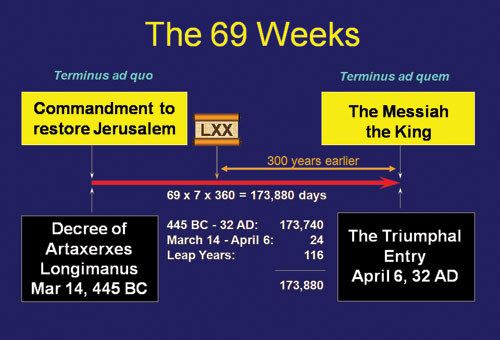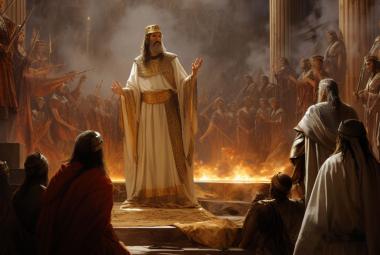On March 16th most churches will celebrate Palm Sunday, the Sunday before Easter. This event, also known as “the Triumphal Entry,” involves one of the most astonishing passages in the entire Bible.
Irrefutably Documented
To fully appreciate the remarkable significance of the following, it is essential to realize that the Book of Daniel, as part of the Old Testament, was translated into Greek prior to 270 b.c., several centuries before Christ was born. This is a well-established fact of secular history.1
The Septuagint
After his conquest of the Babylonian Empire, Alexander the Great promoted the Greek language throughout the known world, and thus almost everyone-including the Jews-spoke Greek. Hebrew fell into disuse, being reserved primarily for ceremonial purposes (somewhat analogous to the use of Latin among Roman Catholics).
In order to make the Jewish Scriptures (what we call the Old Testament) available to the average Jewish reader, a project was undertaken under the sponsorship of Ptolemy II Philadelphus (285-246 b.c.) to translate the Hebrew Scriptures into Greek. Seventy scholars were commissioned to complete this work and their result is known as the “Septuagint” (“70”) translation. (This is often abbreviated “LXX”; see the diagram on page 9.)
The Book of Daniel is actually one of the most authenticated books of the Old Testament, historically and archaeologically, but this is a convenient short cut for our purposes here. It is critical to realize that the Book of Daniel existed in documented form almost three centuries before Christ was born.
Gabriel’s Zinger
Daniel, originally deported as a teenager (now near the end of the Babylonian captivity), was reading in the Book of Jeremiah. He understood that the seventy years of servitude were almost over and he began to pray for his people.
The Angel Gabriel interrupted Daniel’s prayer and gave him a four-verse prophecy that is unquestionably the most remarkable passage in the entire Bible: Daniel 9:24-27. These four verses include the following segments:
• Daniel 9:24: The Scope of the Entire Prophecy
• Daniel 9:25: The 69 Weeks
• Daniel 9:26: An Interval between the 69th and 70th Week
• Daniel 9:27: The 70th Week
The Scope (verse 24)
Seventy weeks are determined upon thy people and upon thy holy city, to finish the transgression, and to make an end of sins, and to make reconciliation for iniquity, and to bring in everlasting righteousness, and to seal up the vision and prophecy, and to anoint the most Holy Place.
Daniel 9:24
The idiom of a “week” of years was common in Israel as a “Sabbath for the land,” in which the land was to lie fallow every seventh year.2 It was their failure to obey these laws that led to God sending them into captivity under the Babylonians.3
Note that the focus of this passage is upon “thy people and upon thy holy city,” that is, upon Israel and Jerusalem. (It is not directed to the Church.)
The scope of this prophecy includes a broad list of things which clearly have yet to be completed.
The First 69 Weeks
A very specific prediction occurs in verse 25:

Know therefore and understand, that from the going forth of the commandment to restore and to build Jerusalem unto the Messiah the Prince shall be seven weeks, and threescore and two weeks: the street shall be built again, and the wall, even in troublous times.
Daniel 9:25
This includes a mathematical prophecy. As we have noted in previous studies, the Jewish (and Babylonian) calendars used a 360-day year;4 69 weeks of 360-day years totals 173,880 days.
In effect, Gabriel told Daniel that the interval between the commandment to rebuild Jerusalem until the presentation of the Messiah as King would be 173,880 days. The “Messiah the Prince” in the King James translation is actually the Meshiach Nagid, “The Messiah the King.” (Nagid is first used of King Saul.)
Bull’s Eye!
The commandment to restore and build Jerusalem was given by Artaxerxes Longimanus on March 14, 445 B.C.5 (The emphasis in the verse on “the street” and “the wall” was to avoid confusion with other earlier mandates confined to rebuilding the Temple itself.)
But when did the Messiah present Himself as a king? During the ministry of Jesus Christ there were several occasions in which the people attempted to promote Him as king, but He carefully avoided it. “Mine hour is not yet come.”6
The Triumphal Entry
Then one day He meticulously arranges it.7 On this particular day he rode into the city of Jerusalem riding on a donkey, deliberately fulfilling a prophecy by Zechariah that the Messiah would present Himself as king in just that way:
Rejoice greatly, O daughter of Zion; shout, O daughter of Jerusalem: behold, thy King cometh unto thee: he is just, and having salvation; lowly, and riding upon an ass, and upon a colt the foal of an ass.
Zechariah 9:9
Whenever we might easily miss the significance of what was going on, the Pharisees come to our rescue. They felt that the overzealous crowd was blaspheming, proclaiming Jesus as the Messiah the King.8 However, Jesus endorsed it!
I tell you that, if these should hold their peace, the stones would immediately cry out.
Luke 19:40
This is the only occasion that Jesus presented Himself as King. It occurred on April 6, 32 a.d.9
The Precision of Prophecy
When we examine the period between March 14, 445 b.c. and April 6, 32 a.d., and correct for leap years, we discover that it is 173,880 days exactly, to the very day!
How could Daniel have known this in advance? How could anyone have contrived to have this detailed prediction documented over three centuries in advance? But there’s more.
The Interval (verse 26)
There appears to be a gap between the 69th week (verse 25) and the 70th week (verse 27):
And after threescore and two weeks shall Messiah be cut off, but not for himself: and the people of the prince that shall come shall destroy the city and the sanctuary; and the end thereof shall be with a flood, and unto the end of the war desolations are determined.
Daniel 9:26
The sixty-two “weeks” follow the initial seven, so verse 26 deals with events after 69th week, but before the 70th. These events include the Messiah being killed and the city and sanctuary being destroyed. As Jesus approached the city on the donkey, He also predicted the destruction of Jerusalem:
For the days shall come upon thee, that thine enemies shall cast a trench about thee, and compass thee round, and keep thee in on every side, And shall lay thee even with the ground, and thy children within thee; and they shall not leave in thee one stone upon another; because thou knewest not the time of thy visitation.
Luke 19:43-44
The Messiah was, of course, executed at the Crucifixion, “...but not for Himself.”
The city and the sanctuary were destroyed 38 years later when the Roman legions under Titus Vespasian leveled the city of Jerusalem in 70 a.d., precisely as Daniel and Jesus had predicted. In fact, as one carefully examines Jesus’ specific words, it appears that He held them accountable to know this astonishing prophecy in Daniel 9! “Because thou knewest not the time of thy visitation.”
The 70th Week
There is a remaining seven-year period to be fulfilled. This period is the most documented period in the entire Bible. The Book of Revelation, Chapters 6 through 19, is essentially a detailing of that climactic period. The interval between the 69th and 70th week continues, but it is increasingly apparent that it may soon be over.
The more one is familiar with the numerous climactic themes of “end-time” prophecy, the more it seems that Daniel’s 70th Week is on our horizon. Have you done your homework? Are you and your family prepared?
As you celebrate Palm Sunday this month, share with your family and friends this incredible demonstration of just who Jesus really was-and is-and what the significance of all this is to all of us!
Amazing grace, indeed!
For a more complete exposition of this amazing passage, see our briefing package, Daniel’s 70 Weeks. For more on what really happened at Easter, see our briefing package, The Easter Story.
Notes:
- Encyclopedia Britannica, Volume 10, p. 642.
- Leviticus 25:1-22; 26:3-35; Deuteronomy 15.
- 2 Chronicles 36:20-21.
- Genesis 7:24; 8:3,4; Revelation 11:2; 12:6; 13:3,4; etc.
- First identified in Sir Robert Anderson’s classic work, The Coming Prince, first published in 1894. Now available in any Christian bookstore.
- John 6:15. Always in control: John 7:30, 44; 8:59; 10:39.
- Luke 19:28-40.
- Luke 19:39.
- Luke 3:1. Tiberias appointed in 14 a.d.; 15th year, 29 a.d.; the fourth Passover occurred in 32 a.d.
Sources:
Anderson, Robert, The Coming Prince, Hodder & Stoughton, London, 1894. The classic work on the Seventy Weeks of Daniel.
Missler, Chuck, Daniel’s 70 Weeks, Koinonia House, 2004. (Also, the Expositional Commentary on Daniel, 16-hour study on DVD.)







